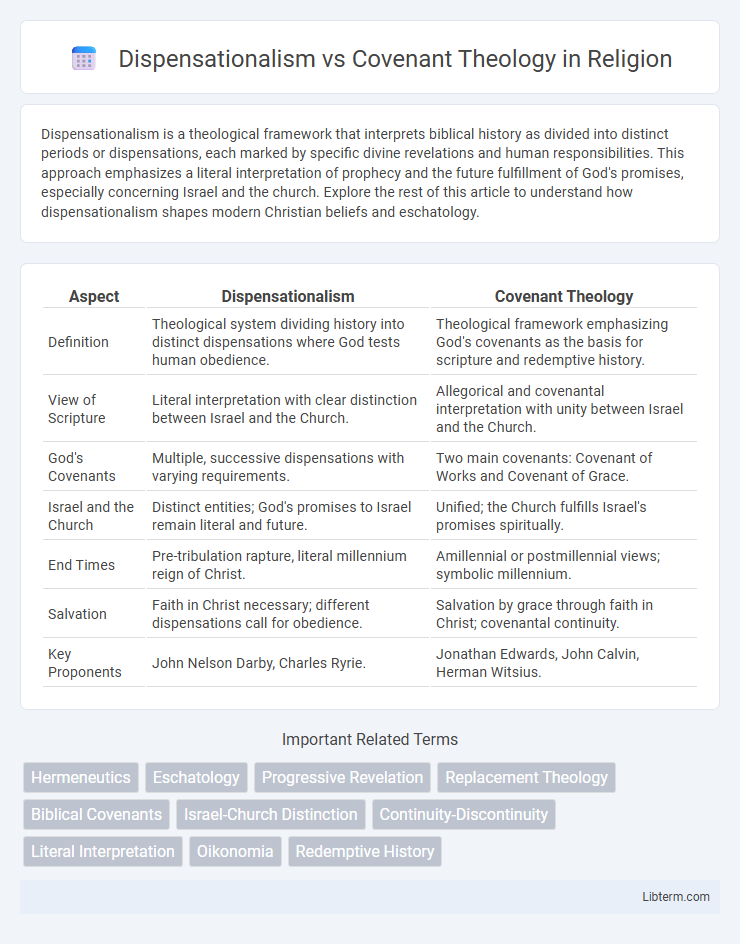Dispensationalism is a theological framework that interprets biblical history as divided into distinct periods or dispensations, each marked by specific divine revelations and human responsibilities. This approach emphasizes a literal interpretation of prophecy and the future fulfillment of God's promises, especially concerning Israel and the church. Explore the rest of this article to understand how dispensationalism shapes modern Christian beliefs and eschatology.
Table of Comparison
| Aspect | Dispensationalism | Covenant Theology |
|---|---|---|
| Definition | Theological system dividing history into distinct dispensations where God tests human obedience. | Theological framework emphasizing God's covenants as the basis for scripture and redemptive history. |
| View of Scripture | Literal interpretation with clear distinction between Israel and the Church. | Allegorical and covenantal interpretation with unity between Israel and the Church. |
| God's Covenants | Multiple, successive dispensations with varying requirements. | Two main covenants: Covenant of Works and Covenant of Grace. |
| Israel and the Church | Distinct entities; God's promises to Israel remain literal and future. | Unified; the Church fulfills Israel's promises spiritually. |
| End Times | Pre-tribulation rapture, literal millennium reign of Christ. | Amillennial or postmillennial views; symbolic millennium. |
| Salvation | Faith in Christ necessary; different dispensations call for obedience. | Salvation by grace through faith in Christ; covenantal continuity. |
| Key Proponents | John Nelson Darby, Charles Ryrie. | Jonathan Edwards, John Calvin, Herman Witsius. |
Introduction to Dispensationalism and Covenant Theology
Dispensationalism divides biblical history into distinct periods or dispensations, emphasizing a literal interpretation of Scripture and a future role for Israel separate from the Church. Covenant Theology views God's relationship with humanity through overarching covenants, primarily the Covenant of Works and the Covenant of Grace, highlighting continuity between the Old and New Testaments. These frameworks shape differing perspectives on prophecy, salvation, and the fulfillment of God's promises.
Historical Origins and Development
Dispensationalism originated in the 19th century through John Nelson Darby and the Plymouth Brethren, emphasizing distinct biblical covenants and a literal interpretation of prophecy. Covenant Theology emerged during the Reformation, rooted in the works of theologians like John Calvin, highlighting two overarching covenants of God--covenant of works and covenant of grace--as frameworks for biblical history. The development of Dispensationalism marked a significant shift from traditional Covenant Theology by introducing a more segmented view of God's redemptive plan across different dispensations.
Core Beliefs of Dispensationalism
Dispensationalism emphasizes a literal interpretation of Scripture, dividing biblical history into distinct dispensations or periods in which God interacts with humanity under different administrative principles. Core beliefs include a clear distinction between Israel and the Church, a premillennial and pretribulational view of Christ's Second Coming, and an emphasis on prophetic fulfillment of Old Testament promises specifically for ethnic Israel. This theological framework highlights the imminent rapture of the Church and the future restoration of Israel as central to God's redemptive plan.
Core Beliefs of Covenant Theology
Covenant Theology centers on the belief that God's relationship with humanity is structured through two overarching covenants: the Covenant of Works, established with Adam, and the Covenant of Grace, fulfilled in Christ for salvation. It emphasizes continuity between the Old and New Testaments, viewing the church as the continuation of Israel in God's redemptive plan. This theological framework highlights God's unchanging promises and the unity of Scripture through a covenantal relationship rather than dispensational divisions.
Interpretative Approaches to Scripture
Dispensationalism interprets Scripture through a literal, historical-grammatical lens, emphasizing distinct dispensations or periods in God's administration and a clear separation between Israel and the Church. Covenant Theology employs a covenantal framework, viewing Scripture as unfolding through overarching covenants like the covenant of works and the covenant of grace, highlighting continuity between Old and New Testament believers. Both approaches influence eschatological views, hermeneutics, and theological applications within Christian doctrine.
The Role of Israel and the Church
Dispensationalism distinguishes Israel and the Church as separate entities with distinct divine purposes, emphasizing future fulfillment of Old Testament promises to Israel. Covenant Theology views Israel and the Church as one unified people of God, interpreting biblical covenants as progressively fulfilled in the Church. This theological difference significantly shapes eschatological expectations and ecclesiological identity within Christian doctrine.
Eschatological Perspectives
Dispensationalism emphasizes a literal interpretation of biblical prophecy, distinguishing between Israel and the Church in God's redemptive plan and anticipating a premillennial, pre-tribulation rapture of the Church. Covenant Theology interprets Scripture through the lens of overarching covenants, viewing the Church as the continuation of Israel, typically expecting a post-tribulation second coming with the millennium symbolically fulfilled. These differing eschatological frameworks influence Christian understanding of end-times events, the nature of God's promises, and the fulfillment of biblical prophecies.
Key Figures and Influential Writings
Dispensationalism is closely associated with John Nelson Darby, whose 19th-century teachings laid the foundation, while the Scofield Reference Bible further popularized its concepts. Covenant Theology finds key articulation in Reformed theologians such as John Calvin and Herman Witsius, with influential writings including Witsius's "The Economy of the Covenants" and the Westminster Confession of Faith. Both frameworks have shaped evangelical eschatology and scriptural interpretation through these seminal figures and texts.
Practical Implications for Christian Living
Dispensationalism emphasizes distinct biblical eras and God's progressive revelation, encouraging believers to anticipate Christ's imminent return and live with an evangelistic urgency. Covenant Theology centers on the continuity of God's covenants, fostering a life of covenantal faithfulness and ethical obedience grounded in God's enduring promises. Both frameworks shape practical Christian living by influencing worship, eschatological hope, and moral decision-making aligned with their theological perspectives.
Conclusion: Comparing Theological Frameworks
Dispensationalism emphasizes distinct biblical eras with specific divine economies, while Covenant Theology highlights a unified covenantal framework throughout Scripture. Both systems provide interpretive lenses that shape believers' understanding of prophecy, salvation history, and God's redemptive plan. Choosing between these theological frameworks influences doctrinal perspectives on eschatology, the relationship between Israel and the Church, and sacramental practices.
Dispensationalism Infographic

 libterm.com
libterm.com